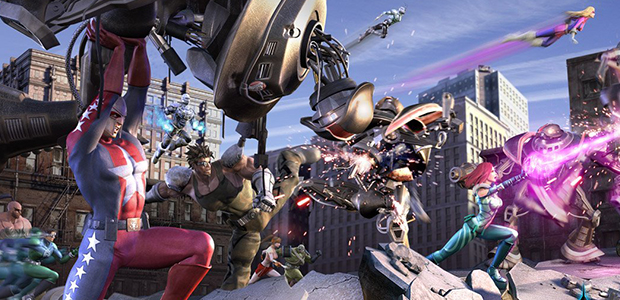The RPG Scrollbars: Second Chance Servers
The MMOs that came back from the dead
It is a truth universally accepted as a buggerance that nothing good lasts forever. The server of your favourite online game will go down. History will move on. The Grim Reaper will move in to slash the network server connection, mumbling about what an obvious waste it is of his talents. Ah, but in the world of digital, things are only over when everyone agrees it's over. As long as enough of the dissenters have sufficient technical skill and cash for servers. And a little bit of luck avoiding lawyers.
Things really started with Ultima Online, back in 1997. It wasn't the first MMO by any stretch and as far back as the days when universities were the only homes for text-based MUDs, people were running their own servers for games. Ultima Online, however, was the first commercial MMO where the idea of players running their own version of the game really hit off. Notably, the common term 'shard', for a player-run server, comes from its storyline, in which evil wizard Mondain's Gem of Immortality shattered into a million shards. Fans reverse engineered the game, produced their own servers with their own rules, and EA largely chose to turn a blind eye to it.
Since then things have become both bigger business and more legally complicated. Laws like the DMCA (Digital Millennium Copyright Act) make acts like poking around and packet sniffing easier targets for corporate lawyers, with only a few games, notably Minecraft, openly embracing players running their own servers and playing around with the rules. Many player-run servers for games for instance offer paid-for features to their community, or let everyone start at Level 70 to jump right into endgame content. The most famous, Nostalrius, intended to be a time-machine, letting World of Warcraft players go back to the original game, before the expansion packs. Even then though, it's a confusing story, with the team trying to work with Blizzard for legitimacy, making a deal with another server to bring back their version of the game, and almost immediately splitting up again.
There are of course entirely legitimate, legal servers for games out there. The game typically credited as the first MMORPG, Meridian 59, is still ticking along quite happily courtesy of Near Death Studios... which is now actually dead... and its community. It no longer runs as a commercial thing, but as a fan-run project that takes donations to keep the server up and running. (Adorably, sign up to its forum and it still asks for an ICQ number...) One of its contemporaries, The Realm also bounced between a couple of companies, from Sierra to Codemasters to Norseman Games. This is ignoring the games that have simply been relaunched by their owners, such as the recent move from The Secret World to Secret World Legends.
One of the more interesting legal projects is Neocron Evolution. Neocron was one of those games that honestly deserved a lot better. It was one of the first MMOs to experiment with action-style combat, even if it was still bound to odd rules where a shot to the head from a Level 50 player did exponentially more damage than the same shot to the head from a new player. What I loved about it though was the world design of its titular city, a cyberpunk metropolis designed to feel like a working city, complete with restaurants, malls, strip-clubs, holographic combat arenas, offices for meetings, and something almost nobody has ever tried before or since, an in-game, in-character bulletin board system. Unfortunately, it was a mostly empty city. Neocron just didn't take off. When I played it after launch, I regularly saw double-figure pop-counts.
Instead of just letting it die with though, the original creators handed it over to a team of fans, and Neocron Evolution is still running. This begs the obvious question of why more MMOs don't do similar... and unfortunately the simple fact is that most of them can't. Even when people are willing or companies are no longer around, the simple fact is that much of the code and design in a modern game isn't the company's to do that with - the amount of middleware or licensed content routinely gets in the way of just bundling everything together and saying "Here you go, enjoy."
Even the will and presence of the original developers doesn't guarantee anything. A couple of years after Neocron came a similar SF MMO called Face of Mankind, which similarly didn't leave much of a mark. It launched in 2006 after a couple of years of testing and went offline in 2008 after a troubled year. It then came back again in 2009, to little fanfare, before developers NeXeon launched a Kickstarter to create a new version called Fall of the Dominion, which promptly took around $60,000, ran a quick open beta in 2014, and then completely disappeared. And that pretty much seems to be that, at least for the foreseeable future.
Far more often though, it's down to the fans to give games new life... and that's no easy challenge. Damn near every MMO spawns at least one 'let's make our own version/server' project, and most of them either spend years and years in development or never happen at all. The closest anyone's come to the dearly departed City of Heroes for instance is Paragon Chat, which allows players to dress up and meet up with other fans on their old stomping grounds, minus the actual fighting/causing crime stuff. The Matrix Online's server emulator MXOEmu is likewise a good long way from letting players jack back into a game I never got the chance to play while it was live, but always thought sounded interesting.
Luckily, other projects have been more successful. I've talked before about Sierra's ImagiNation and Lucasarts' Habitat; two stalwart attempts to bring early gaming worlds back to life. Westwood's largely forgotten should-have-done-Wing-Commander-Online-instead Earth and Beyond has an emulator - though as of February this year, its lead developer decided to step down. Disney's Toontown has an emulator! Shadowbane has an emulator! Star Wars: Galaxies, the game that was more Ultima Online than Knights of the Old Republic, has an emulator and multiple communities, with the community typically recommending the Basilisk server.
Typically to play on these servers you do need to track down a copy of the original game, most likely on 'eBay'. The emulators don't come with the actual game data, both for space and legal reasons. After all, on their own, they might be nothing more than clients designed to connect to any software. It's not the developer's fault if, combined with data files 'from eBay', they turn into some kind of Star War. Usually, the copy 'from eBay' does need a bit of tinkering with though, to point it to the new server and make sure you have the right patches - though it's not entirely uncommon to find specific versions of games already packaged 'on eBay' for older, defunct games. This of course isn't the case for the relaunched versions of games, where the downloads are freely available and legit. Needless to say though, companies typically take a very dim view of players going onto unofficial servers. You're not likely to have the police knocking down your door, but it could be a good way of getting banned. Terms and conditions now typically state outright that your license to the game is only valid on legitimate servers.
In short, thou hast been warned. Though honestly in most cases the player-run servers for games will be a long way behind the official version of any active game, ignoring the fact that the real thing will have a much larger community and typically better support. Nostalrius in particular was of interest to people not because it was a way of playing World of Warcraft without paying Blizzard each month, but because it was a very specific experience that Blizzard doesn't and isn't likely to officially provide. That's also why the team was at least willing to talk to the project runners instead of just marking them off as grubby pirates and such, even if those discussions didn't come to much.
And who knows, maybe in 20 years, it'll be those servers still keeping the adventure alive for both old players and a new generation that doesn't understand why the NPCs aren't holographic and why players still use their hands like some kind of baby toy.
Ha. As if World of Warcraft is ever likely to die.

















